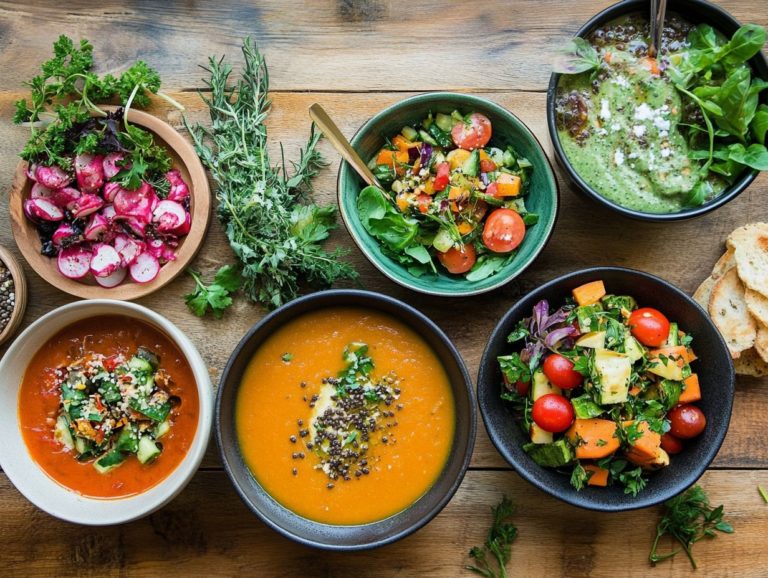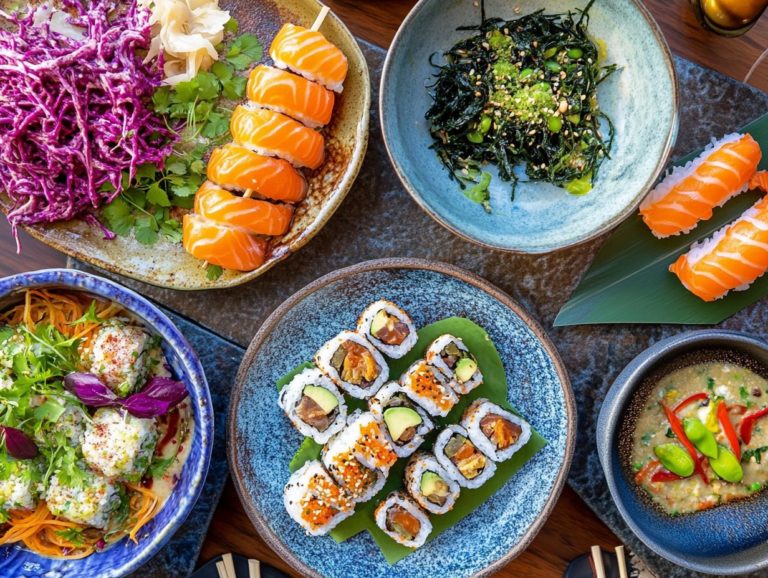The Basics of a Sugar-Free Diet Explained
Are you intrigued by the conversation surrounding sugar-free diets? This guide offers a comprehensive overview, covering everything from the essentials of what a sugar-free diet involves to its many health benefits.
You ll discover practical strategies for cutting out added sugars, identify which foods to steer clear of, and explore delightful alternatives sweeteners made from fruits or plants that don’t add sugar that will satisfy your sweet cravings without the guilt.
You ll also find meal planning ideas to help you adopt this lifestyle.
Prepare to revamp your eating habits and elevate your overall wellness!
Contents
Key Takeaways:

A sugar-free diet involves eliminating added sugars from your meals and snacks, leading to improved health and wellness.
Transitioning to a sugar-free diet can be exciting, and you ll quickly see the benefits with the right tips and strategies, making it a successful and sustainable lifestyle change.
On a sugar-free diet, avoid foods with added sugars, such as processed snacks and drinks, and opt for healthier alternatives like natural sweeteners and homemade meals.
What is a Sugar-Free Diet?
A sugar-free diet, often known as a no-sugar diet, embodies a dietary philosophy that eliminates all forms of added sugars, including sucrose and high fructose corn syrup. It also encourages you to limit natural sugars found in certain fruits and dairy products.
The primary goal of this approach is to significantly reduce sugar consumption, ultimately enhancing your overall health, lowering the risk of diabetes, and promoting the consumption of whole, unprocessed foods. This aligns seamlessly with the guidance provided by esteemed health organizations such as the USDA and the American Heart Association.
Definition and Purpose
The concept of a no-sugar diet is quite simple: it requires you to steer clear of all added sugars while prioritizing healthier food options to mitigate the health risks tied to excessive sugar consumption.
By embracing this dietary choice, you can effectively manage your weight and significantly curb cravings for sugary snacks and beverages. This approach encourages whole foods, promoting better overall nutrition that energizes your body and keeps you feeling vibrant throughout the day.
Incorporating lifestyle changes, like meal prepping and practicing mindful eating, can help you maintain long-term commitment, making it easier to resist the siren call of temptation.
Over time, as you adopt this diet, you may experience enhanced mental clarity and improved health markers, inspiring you to continue your journey toward a healthier, more fulfilling lifestyle.
Benefits of a Sugar-Free Diet
The advantages of adopting a sugar-free diet go far beyond merely eliminating sweet treats. They encompass substantial enhancements in your overall health and wellness, particularly in lowering your risk of chronic health issues like obesity and diabetes.
Improvements in Health and Wellness
Adopting a sugar-free diet can lead to profound improvements in your health and wellness. It often results in reduced sugar intake and the elimination of empty calories typically found in sugary foods.
By embracing mindful eating, you enable yourself to make better nutritional choices, enhancing your mental clarity and providing a steady flow of energy throughout the day. This transformation not only elevates your mood, alleviating the irritability that often accompanies sugar crashes, but also supports your cognitive function.
With improved mental clarity, you may experience heightened productivity and a greater sense of well-being. As you shift toward healthier alternatives, you might notice your cravings diminish, making it easier to navigate social situations and select nourishing foods that align with your health journey.
How to Transition to a Sugar-Free Diet

Transitioning to a sugar-free diet can be exciting! With the right strategies and support, you can experience transformative lifestyle changes, enhanced nutrition, and effective weight management.
Embrace the journey, and you’ll discover the benefits that await you.
Take the first step today toward a healthier you!
Tips and Strategies for Success
To successfully embrace a sugar-free diet, consider implementing several insightful strategies that can help you manage pesky sugar cravings while enhancing your overall nutrition.
One effective approach is to develop the habit of reading food labels carefully. Discover hidden sugars in your food with this simple practice!
Incorporate healthy fats like avocados and nuts along with whole grains into your meals. These choices support fullness and provide sustained energy throughout the day.
Exploring sugar substitutes can also be a game changer. These alternatives give you the sweet flavors you crave without the health drawbacks, making it much easier to stay on course.
By adopting these practical strategies, you can cultivate lasting habits that reduce your sugar intake and promote overall health and well-being.
Foods to Avoid on a Sugar-Free Diet
Avoiding specific foods is crucial for maintaining a sugar-free diet. Many processed items and sugary snacks are packed with added sugars, which can lead to health issues.
Steering clear of these temptations is a significant step toward better health and wellness.
Common Sources of Added Sugar
Common sources of added sugar, such as sugar-sweetened beverages, breakfast cereals, and various condiments, can easily contribute to empty calories that slip under your radar without careful scrutiny of food labels.
These products often rely on high-fructose corn syrup or cane sugar, making it easy to unknowingly exceed your daily sugar allowances.
Flavored yogurts, granola bars, and even those so-called ‘health’ snacks frequently hide significant amounts of sugar, which can spike your blood glucose levels and potentially lead to weight gain over time.
Mastering the art of reading nutrition labels helps you spot hidden sugars that may be listed as maltose, sucrose, or syrup.
It’s also wise to pay close attention to serving sizes. Many snacks might look harmless but often contain multiple servings, dramatically inflating your sugar intake if consumed absentmindedly.
Healthy Alternatives to Sugar
Exploring healthy alternatives to sugar elevates the flavor of your meals without sacrificing nutrition. This approach offers a delightful solution for anyone embracing a sugar-free lifestyle, ensuring you enjoy every bite while maintaining your health goals.
Natural Sweeteners and Substitutes

Natural sweeteners like honey, along with sugar alternatives such as stevia and erythritol, provide delightful options to satisfy your sweet cravings without the drawbacks of added sugars. These alternatives offer fewer calories, lower glycemic indexes, and beneficial nutrients like the antioxidants found in honey.
Take stevia, for example; extracted from the leaves of the Stevia plant, it delivers intense sweetness without any calories. This makes it a superb choice for those managing weight or blood sugar levels. Erythritol, a sugar alcohol, is another excellent option it’s gentle on the gut and exerts minimal influence on blood sugar. However, consume these sweeteners in moderation; they may cause digestive discomfort for some.
Incorporating these sweeteners into your recipes is a breeze:
- Honey pairs beautifully in marinades and salad dressings.
- Stevia shines in smoothies or baked goods, often replacing sugar on a one-to-one basis in many desserts.
Meal Planning for a Sugar-Free Diet
Effective meal planning is essential for your success on a sugar-free diet. It guarantees that you have balanced meals at your fingertips, crafted from whole, unprocessed foods, while effortlessly steering clear of added sugars.
Sample Meal Ideas and Recipes
When exploring meal ideas and recipes for a sugar-free diet, focus on crafting balanced meals that seamlessly integrate healthy grains and fats. This ensures you enjoy both nutrition and satisfaction.
These meals help maintain stable energy levels throughout the day, supporting a healthier lifestyle overall.
Start your day with a delicious chia seed pudding topped with fresh berries! It s a treat packed with nutrients like omega-3 fatty acids, which are healthy fats that benefit heart health.
For lunch, try a quinoa salad mixed with roasted vegetables and a drizzle of olive oil. It s a great way to get complete protein while promoting heart health.
When dinner rolls around, enjoy a grilled salmon fillet accompanied by steamed broccoli and sweet potatoes, providing essential vitamins and minerals.
For snacks, reach for raw veggies paired with hummus or a handful of nuts. These options help curb cravings without any added sugars, making your commitment to a nutritious eating plan more enjoyable.
Frequently Asked Questions
What does a sugar-free diet mean?
A sugar-free diet eliminates or greatly reduces the consumption of added sugars. This includes both natural and refined sugars, such as honey, agave, and table sugar.
Why would someone choose to follow a sugar-free diet?

Many people follow a sugar-free diet for various reasons. Some do it for weight loss or to improve overall health. Others may have specific health conditions, like diabetes, that require limiting sugar intake.
What are the benefits of a sugar-free diet?
A sugar-free diet can offer benefits such as weight loss, improved energy levels, better dental health, and a reduced risk of chronic diseases like diabetes and heart disease.
What are some common foods to avoid on a sugar-free diet?
Foods to avoid include sugary beverages like soda and fruit juices, baked goods, candy, and many packaged snacks. It’s crucial to read labels and avoid foods with hidden sugars, such as sauces, dressings, and condiments.
Can I still eat fruit on a sugar-free diet?
Yes, fruits can be included in a sugar-free diet. However, it’s best to limit high-sugar fruits like bananas, grapes, and mangoes, and focus on low-sugar options like berries and apples.
Are there any potential downsides to a sugar-free diet?
While a sugar-free diet can be beneficial, it’s essential to ensure you’re still getting enough nutrients. Cutting out all sources of sugar may be challenging for some people and could lead to cravings or feelings of deprivation.






